|
Derek Kirkland has been a shearer,
C&W singer and composer of work songs for many decades.
Here he describes working in a rundown 1950s shed.
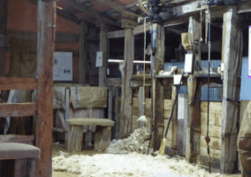
Notes 1.
A wonderful place
This
list of complaints about poorly-maintained woolsheds
is yet another variant of "The Irish Maiden's Lament"
or
Carrigdhoun,
about the
flight of the 'Wild Geese' to France in 1691, with words
by Denny
Lane in the 1840s set to music
by Ellen Mary Downing, and ending ...But
I'll follow you, my Donal Dhu,
For still I'm true to you mo chroidhe.
Lines from the 1815 'Persian' romance Lalla Rookh by Thomas Moore were put to this tune in 1893 as Bendimeer's Stream. In
1902, Percy French modified the lyrics, and Houston
Collisson the tune,
to create the nostalgic lament, Mountains
of Mourne, (1902)
about an Irish navvy in London, Oh
Mary, this London's a wonderful place...
There is also Kiwi soldier's WW2 lament Oh mother, this Egypt's a terrible land. 2.
Bloomin'
a euphemism for bloody as an expression of
disgust.
3.
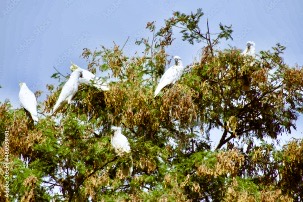 Cocky Cocky
After rich English invaders had stolen thousands of
acres of the indigenous black Australian land-owners'
grassy plains, they were pestered by swarms of white
squatters, who could not be got rid of by shooting
them dead, the way the black families were. The small
farmers were compared to Australia's white cockatoos.
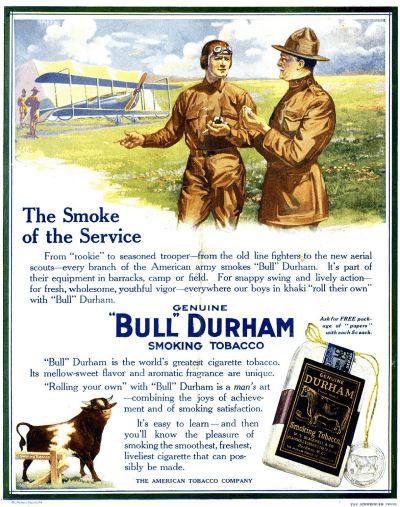 4.
Durries
Strong-as-a-bull tobacco was processed for roll-your-own
cigarettes in
Durham, North Carolina, during WW1, and NZ
soldiers picked up the habit and the name from US
troops.
Click
to view full-size poster
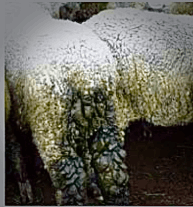 5. Back ends all covered in shit. Well-managed sheep usually excrete firm pellets of excretia, with only about 25% water. But sheep put under stress by poor management:- bad food, extreme weather, intestinal parasites, or being worried by dogs - excrete more runny faeces (scouring) that stick to the wool and form hard smelly balls called dags. 6. Prickles and grit These get into fleeces of sheep
in paddocks with gorse, rosehip and poorly-grassed soil. The
prickles injure the shearers free hand holding the sheep, and
the grit blunts the blades of the shearer's handpiece.
7.
Coarse wool and fineCoarse wool was sold for hard-wearing carpets, and fine wool for clothing, while lambs' wool is softer than ewes' wool. Each fleece requires a different shearing technique, so a mixed flock prevents a shearer from getting into a steady rhythm, is a nightmare for the wool handler, and bales of mixed wool sold for a much lower price. 8. The drafting race If sheep are separated into
similar groups, then the shearers can work much more
efficiently, and earn more money in a day. But a raceway needs
a gate, or two, at its end that can be moved from side to
side.
9.
The catching pen door
The rousie
moves about 20 sheep from the flock into small catching pens
about 2 m wide and 3 m deep so that shearers can catch their
next
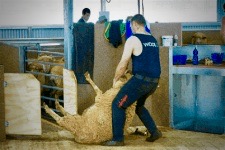 sheep quickly.
sheep quickly.A catching pen door was usually a single sheet of plywood about 1.5m high, with a spring or stretched rubber bike tubes to return it to a closed position. Newer sheds have double doors and spring-loaded hinges. On small
farms, the farmer often used the shearing shed to kill, skin
and gut a hogget, and then butcher the carcass to feed his
family, workers and dogs. The skins were hung on a fence to
dry (sold for making leather?)
For the first 12 years of my
life, roast mutton from the hogget my grandfather killed in
his 2-stand shearing shed was the mainstay of our evening
meals and my school sandwiches the following day. The skins
were hung on a fence to dry (sold for making leather?)
 11.
That bag smells high
If wet dags or
wet sheepskins are left in
a woolsack, they can start decomposing. Phew! 12.
Reach for the Sky
This line
avoids using the word to retch,
or to vomit, by connecting it with the title of this 1950s book.  Catching pens were usually about 2.5m above
ground level and had grating floors to allow sheep excrement to
fall through, and in old sheds the gratings were untreated native
timber. Borer ate away at the floor gratings, causing them to
break.
Catching pens were usually about 2.5m above
ground level and had grating floors to allow sheep excrement to
fall through, and in old sheds the gratings were untreated native
timber. Borer ate away at the floor gratings, causing them to
break. 14. Maggots and dags 
If a sheep becomes badly scoured
with runny faecal matter, blowflies lay eggs in the wet dags,
and the fly maggots start eating away at the sheep's skin.
15.
Sprays and cigarette smokeThe unfortunate animal is than said to be 'flyblown,' and it is a slow, difficult and unpleasant task shearing several of these unfortunate animals in a row. Shearers are
athletes working hard, and need to breathe fresh air to
maintain their pace. Fly spray squirted on flyblown sheep and
cigarette smoke from someone smoking inside the shed
interferes with their work rate - and health.
16.
Ring up
Before
pocket cellphones, a phone in hallway and the ringing of its
large mechanical bells could heard a considerable distance
away.
17. The Union. Shearers frequently moved from
one side of the Tasman to the other, and the Amalgamated
Shearers' Union of Australasia was an early Australia/NZ trade
union formed in the 1880s, A special effort was made to
recruit Maori members, who were highly represented in the
shearing industry.
18.
Flies go on strikeIn the early 1920s, the rural, mostly Maori, Shearers Union merged with the urban, mostly Pakeha, Workers Union, with the motto Tatou Tatou Altogether. 
After the Employment Contracts Act waas passed in 1991, union membership dropped from about 50% of all NZ workers to about 20%. When
blowflies lay their eggs in sheep's wool, it is called flystrike.
19. Finish your 'cut' Shepherds
muster enough sheep for the next day's shearing in the
afternoon and leave them overnight in covered pens so that
their wool is dry the next morning. After 24 hours without
food or water, they must be returned to their paddock the next
day. So the shearers cannot finish until the wool has been cut
off the very last sheep.
19.
Rusty old drum
Often an
open-topped 44 gallon drum
20.
The grinder 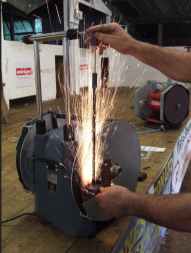 collectedrainwater
running off the roof. There was usually a weatherbeaten
longdrop dunny close by as well. collectedrainwater
running off the roof. There was usually a weatherbeaten
longdrop dunny close by as well.
Rotating
circular sheets of sandpaper (one coarse, one fine) are used
to resharpen
the comb and cutter of a
shearer's handpiece. The grinder must be correctly
aligned to get them properly sharpened.
A shearer generally changes
his blades about 6 times a day, after each 90 minute run.
21.
Cup of tea and Your lunch
In 1979, when I worked in a
shearing shed (as the rousie for crutchers), the farmer's wife,
Joan A, would turn up at 10am with a big wicker basket full of
scones, and a 2-gallon billy of tea. We sat on the clean,
newly-pressed wool-bales and drank the tea from big enamel mugs.
For lunch we walked over to the farmer's house, and ate a dinner of roast mutton, potatoes and pumpkin, plus boiled carrots and cabbage, followed by a steamed pudding and stewed fruit covered in custard, and tea in proper cups and saucers Afternoon tea and the evening meal at 6 pm were repeat performances. We started each day with a cup of
tea and hot toast at about 5am, and Joan had a cooked breakfast
ready for us at the end of our first run:- mutton chops,
bacon, fried eggs, Watties beans and
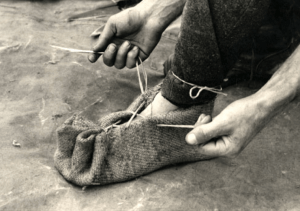 tomato
sauce, and lots of toast. Plus tea. tomato
sauce, and lots of toast. Plus tea.The crutchers wore moccasins they made from hessian wool bales, and I can't remember whether or not they tied their saddle-tweed trouser-ends with bowyangs like my grandad did. Other sheep-farming songs Wool
Away Jack - The
Life of a High-country Shepherd - McKenzie's
Ghost - The Old
Mackenzie Trail
- Up
the Mangapapa - Gutboard
Blues
- Scourer
From Mataura -
Wartime Knitting
- The Peavey Song
Placed on NZFS website May 2024 |